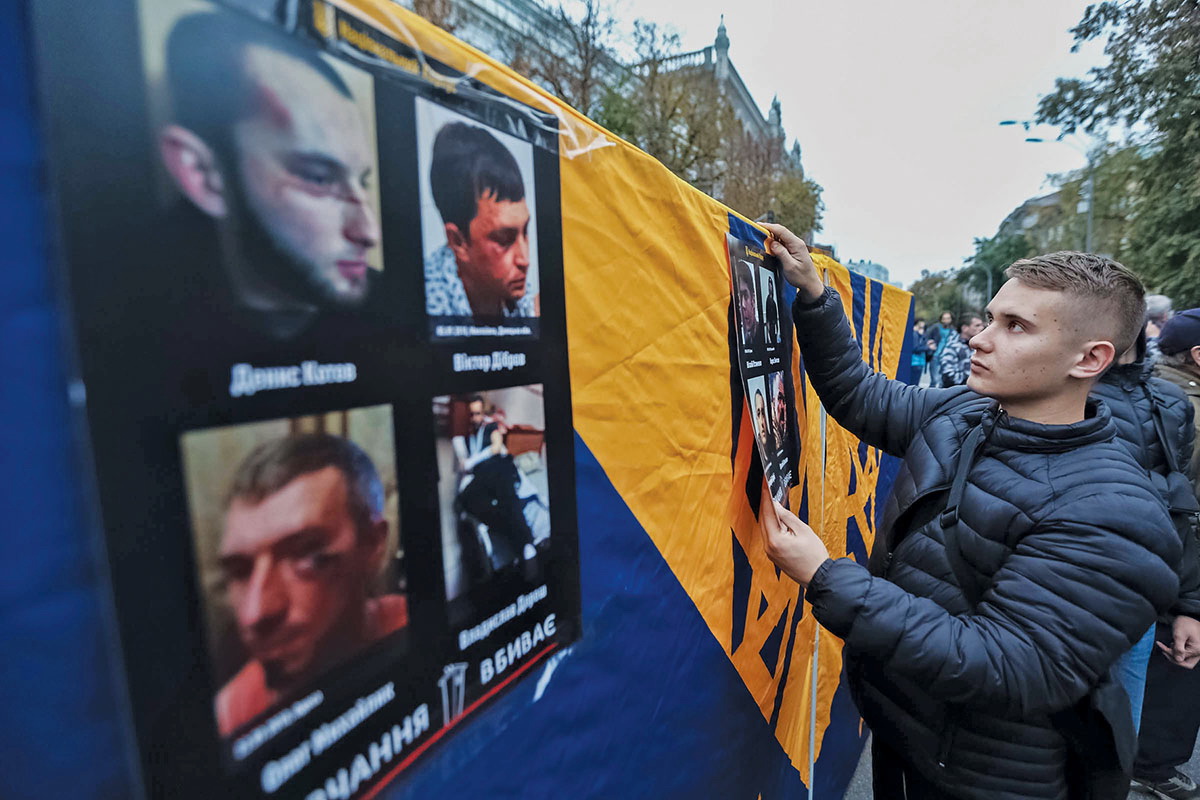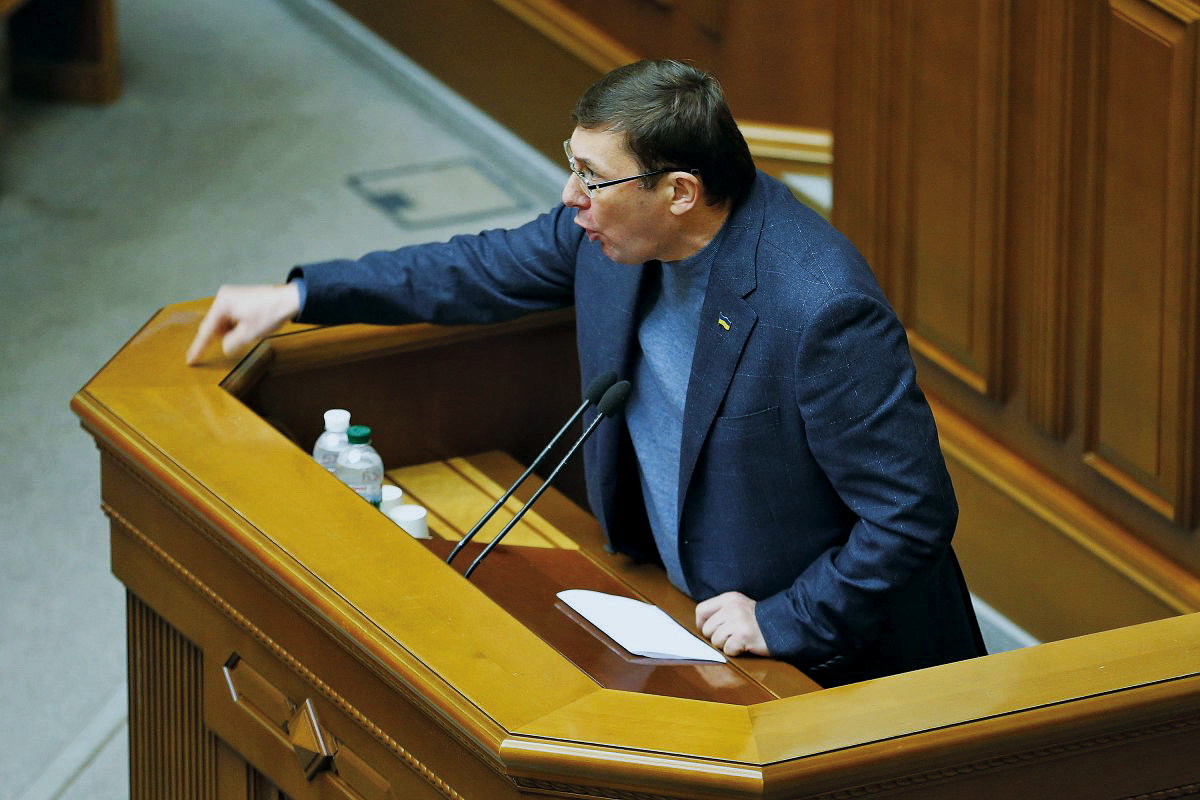The shocking death of whistleblower Kateryna Gandziuk on Nov. 4 as a result of an acid attack has underlined Ukraine’s lack of progress in establishing the rule of law.
The murder is the latest of at least 10 killings of activists and journalists in Ukraine since the 2013–2014 EuroMaidan Revolution, which ousted President Viktor Yanukovych. There have also been at least 93 violent attacks on activists and journalists since the revolution, including at least six attempted murders.
None of those who ordered the murders were found. Only in half of the murder cases, suspected hitmen were identified. None have been convicted yet. Yet Prosecutor General Yuriy Lutsenko on Nov. 6 again denied accusations that cases were being sabotaged, arguing against the evidence that law enforcers were, in fact, doing a great job.
But others warn that law enforcement’s failure to adequately investigate the attacks is causing the level of violence to rise.
Assaults on activists “happen due to impunity,” said Olena Sotnyk, a lawmaker with the 25-member Samopomich Party faction and a member of the parliamentary commission that is investigating Gandziuk’s murder. “If the law enforcement system fails to fulfill its key functions and investigate crimes, a major wave of violence ensues.”
Sotnyk said that Ukraine’s post-EuroMaidan Revolution police, prosecutors and courts were shielding each other.
“The police, the prosecutor’s office and courts act as a sort of an organized crime group,” Sotnyk said. “They work together and cover up for each other… In the regions, the leadership of law enforcement agencies has not been replaced.”
Gandziuk herself expressed similar thoughts in a video address she made from her hospital bed in September.
“I look bad now, but at least I’m being treated by good Ukrainian doctors,” the heavily bandaged activist said. “And I know for sure that I look better than justice and the rule of law in Ukraine, because they’re not being treated by anyone.”
Numerous attacks
According to the Human Rights Information Center, 31 of the activists attacked after the EuroMaidan Revolution were involved in exposing corruption, 23 protected the environment, and 15 defended human rights. Lawyers, volunteers helping the army, and LGBT activists were also among those attacked.
In the murder investigations, the police have found suspected hitmen — but not those who ordered the killings — in half of the cases, said Tetiana Pechonchyk, head of the Human Rights Information Center.
But in 90 percent of the investigations into non-lethal attacks on activists, no suspects were found at all, she added.
“I see here two main reasons. First, corruption, which penetrates everything in the country… and then homophobia and xenophobia,” Pechonchyk said.
“The attacks are usually committed by some criminal or half-criminal groups linked to local authorities, business people, or law enforcement. And people who dare to oppose them and expose corruption and criminality are the victims.”
Ukraine also has a long list of unsolved murders from before the EuroMaidan Revolution. More than 50 Ukrainian journalists have been killed or have died under suspicious circumstances since the country became independent in 1991.
The most high-profile of them was Georgiy Gongadze, the editor-in-chief of the Ukrainska Pravda online newspaper, who was killed in 2000.
While ex-police official Oleksiy Pukach was sentenced to life in prison for the murder in 2013, others implicated in the crime, including former President Leonid Kuchma, have never gone on trial. Kuchma denies being involved in the murder.
Learn about other public figures killed in Ukraine over the past few years by the link.

A protester hangs portraits of civic activists assaulted all over Ukraine at a rally in front of the Presidential Administration in Kyiv on Sept. 27. (Kostyantyn Chernichkin)
Horrific attack
Gandziuk, a whistleblowing municipal official, died in a hospital on Nov. 4 after undergoing numerous surgeries following the acid attack on her in Kherson on July 31. As much as 40 percent of her body suffered severe chemical burns.
Police have arrested five people suspected of her murder — all former war veterans from the Ukrainian Volunteer Army, an offshoot of the nationalist Right Sector group. Photographs of one of them, Volodymyr Vasyanovych, show neo-Nazi tattoos on his body.
All of the suspects have admitted being involved in the attack.
Gandziuk’s friends said on Nov. 5 that Igor Pavlovsky — an aide to Mykola Palamarchuk, a lawmaker with the 135-member President Petro Poroshenko’s Bloc faction — was under investigation for allegedly passing money from the person who ordered the attack to the perpetrators. They said that the police were covering up for Pavlovsky and had helped him escape arrest.
The police did not respond to a request for comment.
Lutsenko later indirectly confirmed that information on Pavlovsky had been leaked, without naming him, referring to a leak of information that had occurred on Nov. 5.
Pavlovsky denied the accusations, although he confirmed that he knew Serhiy Torbin, one of the suspects, and that he had been questioned by the police in the case.
Lutsenko’s rant
The murder prompted the Verkhovna Rada to request reports from Lutsenko, National Police Chief Serhiy Knyazev, and head of Ukraine’s Security Service Vasyl Hrytsak on Nov. 6.
Lutsenko said that 12 people were being investigated as having potentially ordered the murder. None of them has been charged, however.
He also lashed out at opposition politicians and activists who have criticized law enforcement agencies for the lack of progress in investigating attacks on activists. He said that activists and lawmakers were using Gandziuk’s death for their own public relations and political purposes.
In an expletive-laden rant, Lutsenko claimed that the Prosecutor General’s Office and other law enforcement agencies were making a lot of progress in the cases.
Several lawmakers said Lutsenko had told Samopomich Party lawmaker Iegor Soboliev to “suck his dick” and called him an “idiot with brain diarrhea.”
He also called the activists and lawmakers who had demanded a further investigation into the murder of lawyer Iryna Nozdrovska in December “a gang of scoundrels.”
Resignation
Meanwhile, 77 civil society groups on Nov. 5 called for the resignation of Lutsenko and Interior Minister Arsen Avakov.
“The brutal reprisal against Kateryna Gandziuk is an act of intimidation of the whole civil society in Ukraine, of all active citizens who, in cities, towns and villages, stand against corruption and organized crime that have been entrenched for decades,” they said.
“Corruption, impunity and lack of effective police and prosecution reform are the causes of the mass persecution and attacks on civic activists… And we also demand resignation of Prosecutor General Yuriy Lutsenko and Interior Minister Arsen Avakov, who sabotaged the reform of law enforcement agencies in Ukraine.”
Lutsenko on Nov. 7 submitted his resignation to President Petro Poroshenko, but many saw it as a publicity stunt rather than a serious offer to quit. The parliament rejected his resignation in a non-binding and legally dubious vote on Nov. 6 even before he submitted his resignation letter.
If Lutsenko is not bluffing, he may be trying to leave the job of prosecutor general before the 2019 elections and thus escape responsibility for the failures of the prosecutor’s office, Zlata Simonenko, a law enforcement expert at the Reanimation Package of Reforms, told the Kyiv Post.
In his turn, Avakov, who as interior minister oversees the Ukrainian police, never commented on Gandziuk’s death. He ignored the calls for resignation as well.

Prosecutor General Yuriy Lutsenko reports on the investigation into the murder of whistleblower Kateryna Gandziuk and attacks on other activists at the Verkhovna Rada on Nov. 6. Lutsenko swore, lashed out at his critics and told one of the lawmakers to “suck his dick.” (UNIAN)
Another commission
The Rada on Nov. 6 created an investigative commission to monitor the investigations into Gandziuk’s murder and other attacks on activists.
However, Lutsenko said law enforcement agencies would not give any information to the investigative commission, due to the fear of leaks.
Lutsenko’s refusal to give information to the investigative commission may be an attempt to hide a lack of progress in the cases — such as the mismatch between the declared numbers of interrogations and the actual figures, and the lack of information obtained from interrogations, Simonenko said.
Given the high-profile character of the investigations, sharing some of the investigative materials with the commission would be completely legal and justified, Simonenko added.
A group of Gandziuk’s friends, who started a “Who ordered Katya Gandziuk’s murder” Facebook page, wrote there they did not trust the commission as they believe most of its members are biased in favor of the government and are against a proper investigation.
Sabotage
Contrary to Lutsenko’s claims, there is evidence that the Gandziuk investigation has been botched or even sabotaged.
The case was initially classified by police as “hooliganism” despite it clearly being an assassination attempt.
Gandziuk’s friends, not the police, ordered a forensic examination of the acid used in the assault, and arranged for photofit images of the attackers to be made.
Moreover, the police initially arrested an apparent scapegoat, Mykola Novikov, as a suspect in the murder. Novikov was later released after Gandziuk’s friends carried out their own investigation and confirmed his alibi.
Police involvement?
The police’s reluctance to investigate the murder led to speculation that Interior Ministry and police officials and their allies could be linked to the attack. Interior Ministry spokesman Artem Shevchenko denied the accusations.
Under public pressure, Lutsenko transferred the case from the police to the Security Service of Ukraine in August. He said that the attack had been ordered by “law enforcement and state officials, with the help of separatist organizations.”
Local police officers were among the main targets of Gandziuk’s criticism. The suspected organizer of the attack, Serhiy Torbin, is a former police officer.
In 2017, Gandziuk alleged that Artem Antoshchuk, who then headed the police department for economic crimes in Kherson Oblast, had demanded a kickback of 3 percent of the city budget from the municipal authorities. Antoshchuk denied the accusations.
Gandziuk had also been critical of Kirill Stremousov, a pro-Russian top official of the Socialist Party, led by Ilya Kiva.
Kiva is a former police official and aide to Avakov, and is the current head of the Interior Ministry’s labor union.
Stremousov denied being involved in the attack on Gandziuk, while Kiva first lashed out at the activist, accusing her of corruption, and then denied his party had been involved in the attack.
Gandziuk also accused Vladyslav Manger, the head of Kherson Oblast’s legislature, and Kherson Oblast Governor Andriy Gordeyev of being behind an illegal logging scheme. They too deny accusations that they were involved in the attack on the activist.
